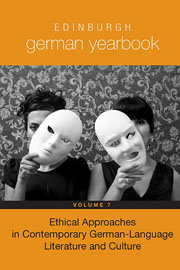 Edinburgh German Yearbook 7
Edinburgh German Yearbook 7 Book contents
- Frontmatter
- Contents
- Introduction: Ethical Approaches in Contemporary German-Language Literature and Culture
- “The Absoluteness of the Knowledge Once Possessed”: 1968 Ethics and Consensual Ethics in Uwe Timm's Novel Rot
- What the World Needs Now: Rancière, Ethology, and Christian Petzold's Toter Mann (2001) and Wolfsburg (2003)
- Materiality and Ethics in Recent German Prose Narratives by Angelika Overath and Angela Krauß
- Shameful Stories: The Ethics of East German Memory Contests in Fiction by Julia Schoch, Stefan Moster, Antje Rávic Strubel, and Judith Schalansky
- Affective Encounters and Ethical Responses in Robert Schneider's Die Luftgängerin and Sybille Berg's Vielen Dank für das Leben
- Narrative Ethics and the Problems of Age and Aging in Annette Pehnt's Haus der Schildkröten
- “So ähnlich könnte es gewesen sein, aber […]”: Unethical Narrations of Emily Ruete's “Große Wandlungen”
- Enlightenment Fundamentalism: Zafer Şenocak, Navid Kermani, and Multiculturalism in Germany Today
- Voicing Rupture: Ethical Concerns in Short Prose and Lyric Texts by Yoko Tawada
Enlightenment Fundamentalism: Zafer Şenocak, Navid Kermani, and Multiculturalism in Germany Today
Published online by Cambridge University Press: 05 December 2013
- Frontmatter
- Contents
- Introduction: Ethical Approaches in Contemporary German-Language Literature and Culture
- “The Absoluteness of the Knowledge Once Possessed”: 1968 Ethics and Consensual Ethics in Uwe Timm's Novel Rot
- What the World Needs Now: Rancière, Ethology, and Christian Petzold's Toter Mann (2001) and Wolfsburg (2003)
- Materiality and Ethics in Recent German Prose Narratives by Angelika Overath and Angela Krauß
- Shameful Stories: The Ethics of East German Memory Contests in Fiction by Julia Schoch, Stefan Moster, Antje Rávic Strubel, and Judith Schalansky
- Affective Encounters and Ethical Responses in Robert Schneider's Die Luftgängerin and Sybille Berg's Vielen Dank für das Leben
- Narrative Ethics and the Problems of Age and Aging in Annette Pehnt's Haus der Schildkröten
- “So ähnlich könnte es gewesen sein, aber […]”: Unethical Narrations of Emily Ruete's “Große Wandlungen”
- Enlightenment Fundamentalism: Zafer Şenocak, Navid Kermani, and Multiculturalism in Germany Today
- Voicing Rupture: Ethical Concerns in Short Prose and Lyric Texts by Yoko Tawada
Summary
Since the 2010 publication of Thilo Sarrazin's controversial bestseller Deutschland schafft sich ab, there has been renewed debate in Germany over the country's cultural identity and the success of policies that promote multiculturalism. Central to these debates has been the question of the integration and assimilation of Germany's large and growing Muslim population. The role and place of Islam in contemporary German society has increasingly been both a source of controversy and an impetus for dialogue about religious freedom and tolerance. The issue of whether or not Islam is compatible with european values is explored in greater depth in recent works by two of Germany's leading Muslim writers and intellectuals, Zafer Šenocak's Deutschland: Eine Aufklärungsschrift (2011) and Navid Kermani's Wer ist wir? Deutschland und seine Muslime (2010). While Şenocak was born in 1961 in Turkey and moved to Germany as a child, Kermani was born in 1967 in Germany to Iranian parents. Both are self-identified Muslims who write about their experiences as German Muslims and position themselves as writer-intellectuals who embrace multiple identities and thus straddle both the eastern and Western worlds. An analysis of their works and their relationship to European culture, including the enlightenment, is fruitful in helping bridge the growing gap between eastern and Western cultural traditions and values and in addressing the question of the possibility of multicultural societies in Western Europe.
- Type
- Chapter
- Information
- Edinburgh German Yearbook 7Ethical Approaches in Contemporary German-Language Literature and Culture, pp. 139 - 158Publisher: Boydell & BrewerPrint publication year: 2013


